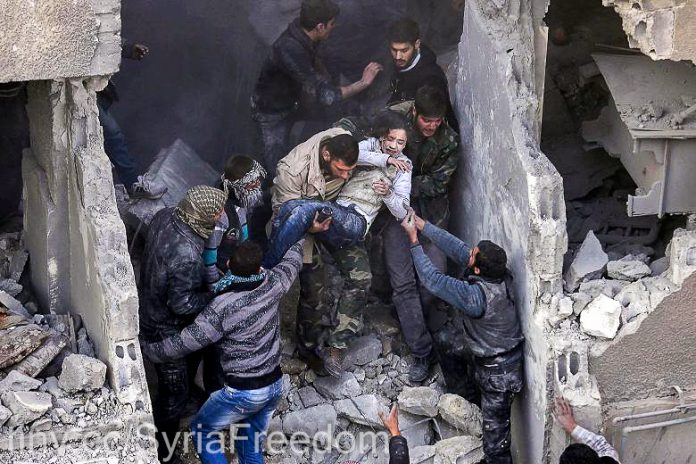As tensions rise in Syria, German Chancellor Angela Merkel said her country stands ready to assist allies, but that the military would not be involved.
Merkel told a press conference on April 12 that Germany’s military “will not participate in possible military actions” in Syria. She stressed, however, that Berlin supported the need to “send a clear signal that the use of chemical weapons” is unacceptable.
“Just doing nothing at all is also difficult,” said Merkel, adding that if the US, UK and France were to take military action, Germany would seek non-military ways to help.
As reported by Deutsche Welle (DW), Germany’s international broadcaster, Merkel also criticised Russia for blocking a full investigation by the Organisation for the Prohibition of Chemical Weapons (OPCW) into the alleged Syrian chemical weapons attack. She said this “does not cast Russia in a positive light”.
The chancellor’s comments followed a bilateral meeting with her Danish counterpart Lars Lokke Rasmussen, who said that Denmark’s stance on the issue was comparable with its neighbour to the south.
Asked twice at the press conference whether US President Donald Trump’s tweets make diplomacy more difficult, Merkel tried to sidestep the questions.
On April 11, Trump tweeted: “Russia vows to shoot down any and all missiles fired at Syria. Get ready Russia, because they will be coming, nice and new and ‘smart!’ You shouldn’t be partners with a Gas Killing Animal who kills his people and enjoys it!”
But Germany’s new government coordinator for trans-Atlantic relations, Peter Beyer, told DW that Trump’s unusual style of presidential communication posed “new challenges” for Germany.
“First of all, the United States remain the most important partner of Germany and Europe as a whole on a global scale,” Beyer said. “On the other hand, we see in the past a development that concerns us, that brings a change to how we communicate across the Atlantic as compared to former times. So we’re facing new challenges.”
Beyer described military intervention in Syria as the “ultima ratio”, but said that the “barbaric, inhumane” gas attacks in Douma “need an answer”.
On April 12, Trump tweeted: “Never said when an attack on Syria would take place. Could be very soon or not so soon at all!”
Middle East analyst Guido Steinberg told DW he suspected that officials in the Pentagon would have rushed to brief Trump after his April 11 threat.
“Probably after [Trump] tweeted this message, his counsellors told him about the dangers of what is happening there,” Steinberg said. “The situation is not like last year any more. There are Russians, there are Iranians, there are Shia militia on many Syrian bases, so the dangers are a lot higher than in the past.”
“I think that’s part of the reason why the United States seems to hesitate right now, simply because Trump is surrounded by professional soldiers. They know about the dangers if you hit the Russians in any place in Syria.”

